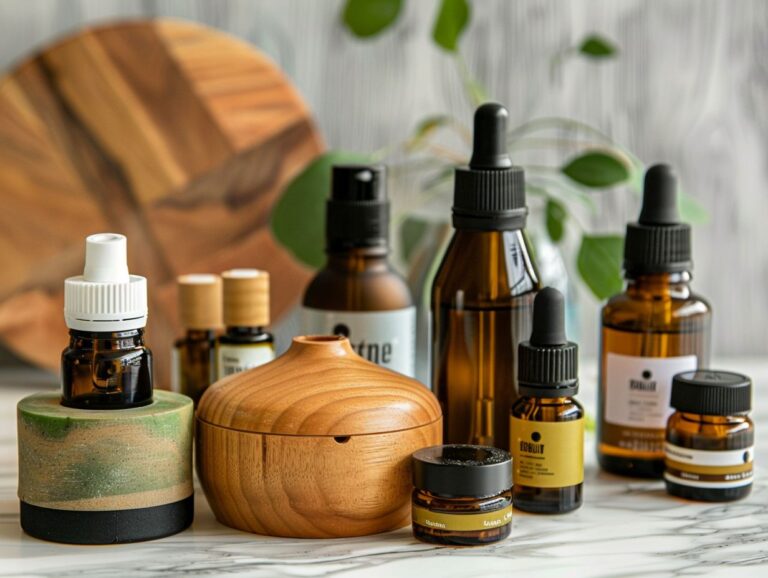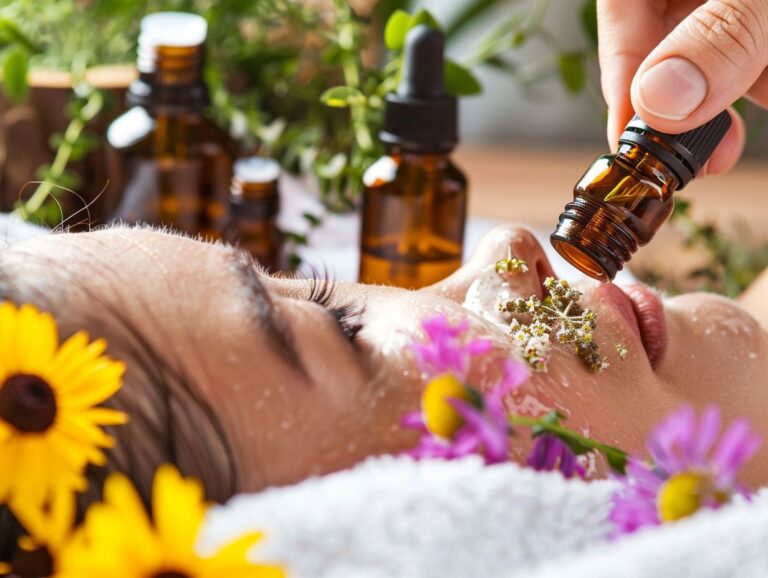What is Patchouli Oil Used for in Aromatherapy
Patchouli oil is a popular essential oil known for its earthy, musky scent and numerous benefits in aromatherapy.
It can help relieve stress and anxiety, treat skin conditions, and repel insects, making it a versatile oil with a wide range of uses.
We will explore how patchouli oil is produced, its benefits in aromatherapy, different ways to use it, potential side effects, where to purchase it, and how to store it properly.
Let’s dive in and discover the wonders of patchouli oil!
Key Takeaways:
What is Patchouli Oil?
Patchouli oil is a type of essential oil derived from the leaves of the patchouli plant (Pogostemon cablin), a bushy herb native to tropical regions of Asia.
This aromatic oil has been used for centuries in traditional medicine, perfumery, and spiritual practices, owing to its distinct earthy, musky fragrance.
The extraction of patchouli oil involves a meticulous process that includes steam distillation of the dried leaves of the plant. The leaves are carefully harvested, dried, and then subjected to the distillation process, which captures the essence of the plant, resulting in the concentrated oil.
Patchouli oil is renowned for its grounding and calming properties, making it a popular choice in aromatherapy and skincare products.
How is Patchouli Oil Produced?
The production of patchouli oil involves steam distillation of the dried leaves of the patchouli plant, resulting in an aromatic and viscous essential oil.
During the steam distillation process, the patchouli plant leaves are carefully harvested, ideally at their peak maturity to ensure high oil yield. These leaves are then dried to reduce moisture content, which is crucial for effective distillation. Once dried, they are placed in a distillation apparatus where steam is passed through them, carrying the aromatic compounds upwards. The steam carries the essential oil molecules, which are then condensed back into a liquid form.
This liquid, a combination of water and essential oil, is collected and allowed to separate. The patchouli essential oil naturally rises to the top due to its hydrophobic properties. The oil is then carefully extracted and further processed to enhance its purity and potency before being packaged and distributed for various applications.
What are the Benefits of Patchouli Oil in Aromatherapy?
Patchouli oil offers numerous benefits in aromatherapy, including its anti-inflammatory properties, pain-relieving effects, and efficacy in treating various skin conditions.
Studies have shown that patchouli oil has potent anti-inflammatory properties, making it a valuable asset in reducing inflammation in conditions like arthritis or muscle strain. Not only does it help to alleviate pain with its analgesic effects, but it also aids in promoting relaxation and reducing stress and anxiety.
Regarding skin ailments, patchouli oil is renowned for its therapeutic effects. Its antifungal and antibacterial properties can help combat acne, eczema, and dermatitis, while its natural astringent properties contribute to toning and rejuvenating the skin.
Relieves Stress and Anxiety
Patchouli oil is known for its ability to relieve stress and anxiety, promoting relaxation and enhancing mood due to its calming and grounding aroma.
When inhaled, the rich and earthy fragrance of patchouli stimulates the release of endorphins, the body’s natural feel-good chemicals, which can help reduce feelings of anxiety and boost overall well-being. Its deep, musky scent has a sedative effect, making it an excellent choice for those looking to unwind after a long day. The unique aroma of patchouli oil can bring about a sense of renewal and rejuvenation, creating a serene environment that eases tension and fosters tranquility.
Improves Mood and Promotes Relaxation
The use of patchouli oil in aromatherapy can improve mood and promote relaxation by creating a sense of calmness and tranquility through its rich and earthy scent.
Studies have shown that inhaling patchouli oil can stimulate the release of certain hormones in the brain that are associated with positive emotions and relaxation. This can lead to a reduction in feelings of stress and anxiety, allowing individuals to unwind and find peace amidst a hectic day. The aromatic compounds present in patchouli oil can help alleviate symptoms of insomnia and improve overall sleep quality, contributing to a sense of rejuvenation. Its soothing properties work synergistically to create a serene atmosphere, making it a popular choice for individuals seeking to enhance their mental well-being.
Reduces Inflammation and Pain

Patchouli oil exhibits anti-inflammatory properties that help reduce inflammation and alleviate pain by modulating immune cell responses and targeting inflammatory pathways.
This essential oil, derived from the leaves of the Patchouli plant, contains compounds like patchoulol and alpha-bulnesene, which are responsible for its potent biological activities. When applied topically, patchouli oil can inhibit the production of inflammatory mediators such as cytokines and prostaglandins, thus exerting its anti-inflammatory effects. By interfering with the NF-kB pathway, it suppresses the expression of genes associated with inflammation. The analgesic properties of patchouli oil can help reduce pain perception in conditions like arthritis and muscle soreness.
Treats Skin Conditions
Patchouli oil is beneficial in treating various skin conditions such as dermatitis and acne due to its antimicrobial and anti-inflammatory properties that help soothe and heal the skin.
The antimicrobial properties of patchouli oil make it effective in combating harmful bacteria on the skin’s surface, reducing the risk of infections and breakouts. In addition, its anti-inflammatory characteristics can help calm redness and irritation associated with skin conditions like dermatitis.
The healing properties of patchouli oil promote skin regeneration, aiding in the repair of damaged tissues. This natural remedy is also known for its ability to balance oil production, making it suitable for individuals with acne-prone or oily skin.
Repels Insects
Patchouli oil serves as a natural insect repellent, effectively repelling insects like mosquitoes due to its insecticidal properties that deter unwanted pests.
Its high concentration of patchoulol is responsible for its potent insect-repelling qualities, making it a popular choice for those seeking a natural alternative to chemical insecticides. Studies have shown that patchouli oil can not only repel insects but also act as a natural insecticide, disrupting their life cycle and preventing infestations.
How to Use Patchouli Oil in Aromatherapy?
Patchouli oil can be utilized in aromatherapy through methods like diffusing, topical application, and inhalation to experience its therapeutic benefits and aromatic properties.
When diffusing patchouli oil, it can help create a calming and grounding atmosphere. The oil can be diluted with water in a diffuser to spread its earthy scent throughout a room.
Topical application of patchouli oil involves diluting it with a carrier oil and then applying it to the skin, which may help with various skin conditions or provide a relaxing massage experience.
Inhaling the aroma of patchouli oil either directly from the bottle or by adding a few drops to a handkerchief can be beneficial for stress relief and emotional balance.
Diffusing
Diffusing patchouli oil in a diffuser allows the aromatic molecules to disperse into the air, filling the space with its earthy and musky fragrance, promoting relaxation and mood enhancement.
As the diffuser releases the patchouli oil particles into the air, they interact with the olfactory senses, triggering a calming response in the brain. This process of olfactory stimulation can have a direct impact on one’s emotional state, helping to alleviate stress and anxiety.
The diffusion of patchouli oil creates a pleasant and inviting atmosphere in your living or workspace, imparting a sense of grounding and tranquility. Its unique scent has the ability to uplift spirits and enhance mental clarity, making it a popular choice for those seeking a natural way to unwind and de-stress after a long day.
Topical Application
Applying patchouli oil topically on the skin allows for absorption of its beneficial components directly into the skin, making it effective in addressing skin conditions and promoting skin health.
When applying patchouli oil, start by diluting it with a carrier oil to prevent skin irritation and enhance absorption. This method ensures that the skin readily absorbs the oil’s active compounds, which contain properties like anti-inflammatory and antimicrobial effects.
The skincare benefits of patchouli oil include its ability to regulate sebum production, making it suitable for oily and acne-prone skin. Its antiseptic properties can also help to combat acne-causing bacteria, reducing breakouts and improving overall skin texture.
Furthermore, patchouli oil has been studied for its therapeutic effects on dermatitis, offering relief from itching, inflammation, and redness. Its soothing properties make it a valuable ingredient in skincare products targeting sensitive skin conditions.
Inhalation

When inhaling patchouli oil, the aromatic compounds interact with the olfactory receptors and trigger a response in the limbic system, which is responsible for emotions and memories. This process can help in reducing stress and promoting relaxation.
The inhalation of patchouli oil can also have a positive impact on the respiratory system by clearing congestion, easing breathing, and supporting overall respiratory health.
The mood-enhancing benefits of patchouli oil through inhalation are attributed to its ability to stimulate the release of certain neurotransmitters like serotonin and dopamine, which play key roles in regulating mood and emotions.
Are There Any Side Effects or Risks of Using Patchouli Oil in Aromatherapy?
While patchouli oil is generally safe for aromatherapy use, some individuals may experience skin irritation or allergic reactions. It is important to consider precautions, potential interactions, and proper dosing when using this essential oil.
Individuals with sensitive skin should be cautious when using patchouli oil, as it has the potential to cause redness, itchiness, or rashes upon contact. Testing a small amount of diluted patchouli oil on a small area of skin before widespread use is recommended to check for any adverse reactions. Pregnant women and individuals with certain medical conditions should consult a healthcare provider before using patchouli oil, as it may have interactions with certain medications or exacerbate existing health issues.
Monitoring for any unusual symptoms or discomfort is crucial, and adjusting the dosage according to individual tolerances can help minimize potential risks associated with patchouli oil in aromatherapy.
Skin Irritation
Patchouli oil may cause skin irritation or allergic reactions in some individuals, especially those with sensitive skin or allergies, highlighting the importance of performing a patch test before extensive use.
Allergic reactions to patchouli oil can manifest as redness, itching, or swelling of the skin. For individuals with pre-existing skin conditions like eczema or dermatitis, the risk of irritation may be heightened.
Skin sensitivity plays a crucial role in determining how a person’s skin reacts to the oil. Patch testing involves applying a small amount of diluted oil to a small area of skin and monitoring for any adverse reactions. This simple precautionary measure can help prevent potential skin issues caused by patchouli oil. Always consult a dermatologist if you experience persistent irritation.
Interactions with Medications
It is essential to be cautious of potential interactions between patchouli oil and certain medications, as the oil may affect drug metabolism or efficacy, leading to contraindications or adverse effects.
When patchouli oil is used concurrently with medications, it can interfere with their absorption, distribution, metabolism, or excretion processes in the body. This interference could alter the effectiveness of the medication or even amplify its side effects. Certain medications, such as blood thinners, anticoagulants, or drugs metabolized by the liver, may particularly be affected by patchouli oil. It is crucial to consult a healthcare professional before combining patchouli oil with any prescription or over-the-counter medicines to ensure safety and avoid potential complications.
Pregnancy and Breastfeeding
Pregnant or breastfeeding individuals should exercise caution when using patchouli oil in aromatherapy, as there is limited research on its safety during these periods. It is advisable to consult healthcare providers before use.
Research suggests that certain components of patchouli oil may have potential effects on hormone levels and uterine contractions, which could pose risks during pregnancy or breastfeeding. Due to the lack of comprehensive studies, the safety of patchouli oil in these circumstances remains uncertain. Professional guidance is crucial to determine the appropriate dosage and application methods that minimize any potential hazards. Healthcare providers can offer personalized advice based on individual health conditions and provide insights on alternative oils that are deemed safer for pregnant and breastfeeding individuals.
Where Can You Purchase Patchouli Oil for Aromatherapy?
Patchouli oil for aromatherapy purposes can be purchased from various sources, including online retailers, local health stores, and specialized aromatherapy shops that offer high-quality essential oils.
When looking to purchase patchouli oil for your aromatherapy needs, consider reputable online platforms such as Amazon, Mountain Rose Herbs, and Edens Garden. These websites offer a wide selection of essential oils, including organic and sustainably sourced options.
Alternatively, if you prefer to buy in person, visit local health stores like Whole Foods, GNC, or specialized aromatherapy shops in your area.
It’s essential to ensure that you are buying from trusted vendors to guarantee the purity and authenticity of the patchouli oil you are purchasing for your aromatherapy practice.
How to Store Patchouli Oil Properly?

Exposure to light and heat can accelerate the degradation process of patchouli oil, leading to a loss of its beneficial properties and aroma. The ideal storage temperature for patchouli oil ranges between 50-77 F (10-25 C) to maintain its chemical composition and efficacy.
Opt for airtight containers made of dark-colored glass to shield the oil from UV rays, which can cause oxidation and diminish its therapeutic benefits. Ensure the storage area is free from extreme temperature fluctuations to prevent spoilage and maintain its integrity.
Frequently Asked Questions
What is Patchouli Oil Used for in Aromatherapy?
In aromatherapy, Patchouli oil is commonly used for its grounding and calming properties. It is well-known for its distinct earthy and woody aroma.
Is Patchouli Oil Beneficial for Skin?
Yes, Patchouli oil is known to have anti-inflammatory and antiseptic properties, making it beneficial for treating skin conditions such as acne, eczema, and dry skin.
Can Patchouli Oil Help with Anxiety and Depression?
Yes, Patchouli oil is believed to have a calming and sedative effect on the mind, making it useful for reducing feelings of anxiety, stress, and depression.
What Other Ailments Can Patchouli Oil Be Used For?
Aside from its effects on the mind and skin, Patchouli oil is also commonly used to relieve symptoms of colds, coughs, headaches, and digestive issues.
How Do You Use Patchouli Oil in Aromatherapy?
Patchouli oil can be used in various ways in aromatherapy, such as through inhalation, diffusion, or dilution with carrier oils for topical application. It can also be added to bathwater or used in massage oils.
Are There Any Precautions to Take When Using Patchouli Oil in Aromatherapy?
While Patchouli oil is generally considered safe for use, it is recommended to dilute it with a carrier oil before applying it to the skin and to do a patch test first. Pregnant women and children should consult with a healthcare professional before using Patchouli oil in aromatherapy.







